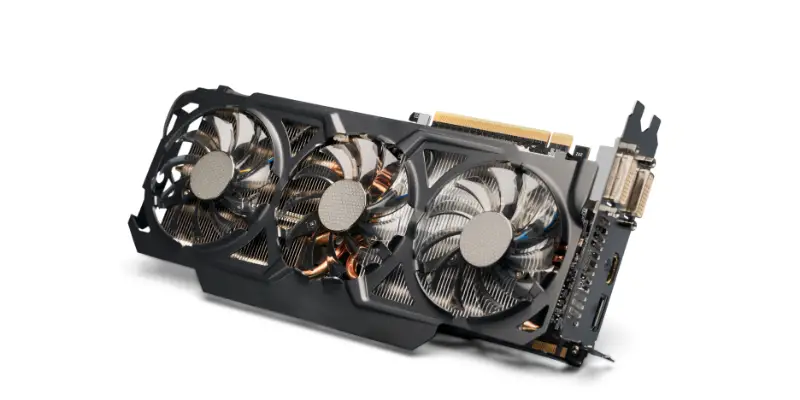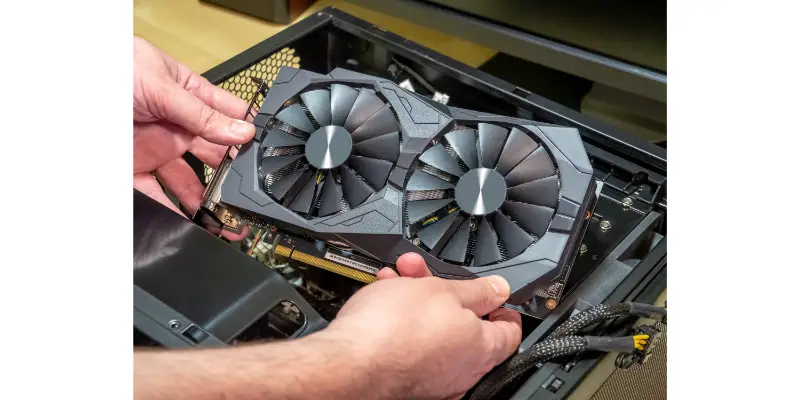Disclaimer: This post may contain affiliate links, meaning we get a small commission if you make a purchase through our links, at no cost to you. For more information, please visit our Disclaimer Page.
If you’ve been noticing blue screens on your computer lately, you might wonder whether it’s an issue with your graphics card.
It is highly probable that a faulty GPU or an overheating GPU will cause BSoD. This is because Windows is detecting a hardware issue that it cannot automatically repair. So it displays a BSoD to prompt the user that something is not functioning as it should be.
Table of Contents
What Is a GPU?
A GPU (graphics processing unit) is used to render high-quality images, videos and content. The better the GPU, the better the images rendered. People who work in graphic design, architecture, and other fields that require working with images or designs rely on their GPU.
GPUs are really important for gamers. The quality of the game’s graphics is enhanced, giving players a more realistic feel. Competitive gamers likely install top-notch GPUs to keep up with the graphics of the latest games.
It is also worth noting that laptops come with an in-built GPU that is difficult to upgrade. At the same time, PC users can upgrade their GPU because the hardware is easily accessible. For this reason, you now get gaming laptops that are equipped with the best technology for rendering high-quality images, videos and content.
What Is the Purpose of a GPU?
GPUs were designed to take the strain off of the CPU with rendering high-quality images, etc. because of this, they can display a much better image at the end because they can work with the CPU to do separate, but important functions.
This is also the reason GPUs have been used for machine learning, which is a branch of AI (artificial intelligence). That’s because it requires a lot of computational power – power that a high-quality GPU can offer.
Where a CPU is designed for lower, more consistent power outputs that can run the ongoing computational functions. A GPU uses parallel processing architecture, which is why it renders images much faster than a CPU.
What Is BSoD?
So this leads us to the next discussion – what is BSoD? It stands for “blue screen of death” which comes up to report a fatal system error when the system has crashed. Depending on the Windows version installed on your PC, this screen may look different.
A BSoD freezes Windows and requires that the system be rebooted in order to continue to operate. The most common causes result from malfunctioning or low-quality processors, power supply issues, faulty RAM or motherboard, and conflicting devices.
When one or more of these parts stop operating, Windows is unable to repair it and displays the BSoD. When this happens, Windows will prompt the user to restart their PC.
Sometimes this can lead to the loss of certain data. It is important to note that there are ways to fix a BSoD. I’ll discuss this a little later. Let’s first take a look at why a GPU can cause a BSoD.
Can a Bad GPU Cause BSoD?
By bad, we mean a malfunctioning GPU. And yes, it can cause a BSoD. That’s because Windows is detecting a problem with the malfunctioning hardware and there’s nothing it can do to repair it so it’ll display a BSoD.
If users continuously encounter a BSoD regardless of any attempts to solve other issues, then there’s a good chance that the GPU is to blame. This may be especially common for competitive gamers. This is why it is important to invest in a GPU for your intended use.
If you plan to do lots of gaming and buy the latest games that require high-quality rendering of images then you’ll need to get a GPU that can keep up. If you’re only concerned about graphics then you may not need the same standard.
Can Overheating GPU Cause BSoD?
It is highly likely that an overheating GPU will cause BSoD. Any overheating can cause it. This is happening to protect your PC because overheating can cause a lot of damage.
So what happens is Windows detects an issue and because it’s something Windows can’t automatically repair, it displays a BSoD. This is intended to let the user know that something is not working well and needs to be repaired.
So, what causes the GPU to overheat? Processors are likely to overhead when they are put under too much pressure, particularly during gaming. It is important to note that a game will not damage your computer, but running a GPU under heavy load can expose issues with your GPU cooling system.
An example is when there is too much heat in the computer case. This means that the GPU ends up drawing in hot air, which then leads to an overheating problem.
Can BSoD Be Repaired?
There are a few things that can be done to restore your PC functioning after a BSoD. The first thing is to determine whether it is, in fact, a hardware issue. You can rule this out by troubleshooting.
If none of your efforts seem to solve the issue, it could be because of a hardware malfunction or problem. Before checking hardware components, you can solve a BSoD by doing a system restore. Go to your troubleshooter, click on Advanced Options, then click on System Restore.
After your computer reboots, then you can select a restore point. While there are different ways to test various hardware components, I will discuss the method pertaining to the GPU and overheating here. To test if your GPU is causing the issue you can run it through a stress test. 3DMark is an example of a stress test that you can use.
Next, test your PC for overheating. Check for things like poor ventilation, dust, or a malfunctioning cooling fan. You can also use a tool like SpeedFan to determine if your computer is overheating.
Once you are able to resolve these issues then BSoD should stop happening. If it doesn’t then you may need to check if there are other issues. Once the issue is solved, make sure to uninstall and reinstall your drivers.
Can a GPU Be Repaired?
This depends on the device. Laptop users should just take their laptops to the manufacturer to be repaired. It is much harder because the hardware components are in-built. For PC users, it is a lot easier to remove and repair hardware components.
So the question is can a GPU be repaired? Many PC users do attempt to fix their GPUs, after all, it is inconvenient to have it crash while you’re doing something important. And not to mention the cost of replacing it.
However, the problem is that it is not usually worth repairing it because you could end up spending lots of money without ever having the issue solved or repaired. Many people think they can replace parts. Realistically, one needs to be a pro at soldering if they want to fix it really well.
If the issue is because of the GPU overheating on the other hand, then the issue is easier to solve. You can make sure that the cooling fan is running properly and clean out any dust. You can avoid overclocking and if you have already used overclocking then restore the settings to their original state.
Finally, you can try to increase the airflow in the computer case. You should make sure that for a blower model you want positive pressure in the case. When it comes to an open-air style GPU, you want negative pressure in the case.
Conclusion
If you’re experiencing a BSoD then there’s something that Windows is struggling to address. Start by troubleshooting software issues, like faulty apps. If the issue persists and tends to happen when you are playing a game or putting your PC under stress, then your GPU may be the culprit.


